专题01 情态动词练习-备战2021高考高中英语语法专项突破训练(原卷版)
专题03 情态动词练习-备战2021高考高中英语语法专项突破训练(原卷版)
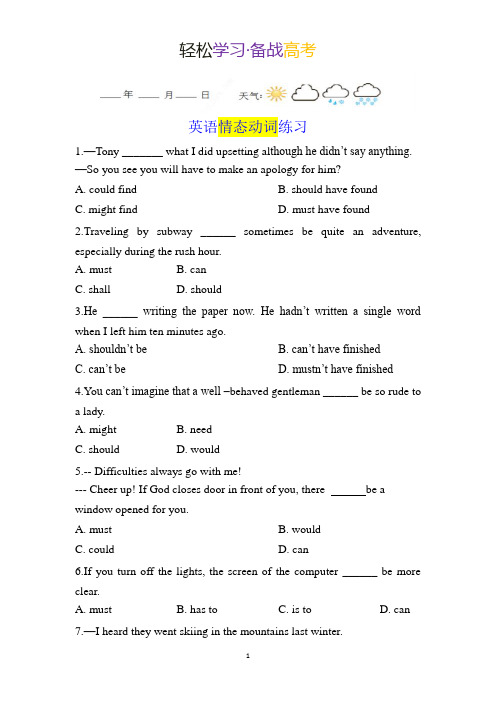
英语情态动词练习1.—Tony _______ what I did upsetting al though he didn’t say anything.—So you see you will have to make an apology for him?A. could findB. should have foundC. might findD. must have found2.Traveling by subway ______ sometimes be quite an adventure, especially during the rush hour.A. mustB. canC. shallD. should3.He ______ writing the paper now. He hadn’t written a single word when I left him ten minutes ago.A. shouldn’t beB. can’t have finishedC. can’t beD. mustn’t have finished4.Yo u can’t imagine that a well –behaved gentleman ______ be so rude toa lady.A. mightB. needC. shouldD. would5.-- Difficulties always go with me!--- Cheer up! If God closes door in front of you, there be a window opened for you.A. mustB. wouldC. couldD. can6.If you turn off the lights, the screen of the computer ______ be more clear.A. mustB. has toC. is toD. can7.—I heard they went skiing in the mountains last winter.—It true because there was little snow there.A.may be notB. won’t beC. couldn’t beD. mustn’t be8.-- Catherine, I have cleaned the room for you.---Thanks. You _______ it. I could manage it myself.A.needn’t doB. shouldn’t have doneC. mustn’t doD. needn’t have done9.--- _____ I go out to play now, Mum?---No, you _____. You should do your homework first.A.May; had better notB. Must; wouldn’tC. May; needn’tD. Must; mustn’t10.—Where is my dictionary?I remember I put it here yesterday.—You___it in the wrong place.A. must putB. should have putC. might putD. might have put11.—Look at these tracks. It ________ be a wolf. I’m sure about it.—You are right! We have to be careful.A.mayB. mustC. can’tD. shouldn’t12.——I called you last night, but no one answered.——Sorry, I____________ sleeping.A.need have beenB. would have beenC. must have beenD. should have been13.Frankly speaking, I am not sure whether I ________ this in the old days with that kind of equipment, which looks quite odd and ridiculous.A. should have doneB. need have doneC. would have doneD. must have done14.According to the law in our city, the money _____ be divided between you two.A. willB. shouldC. shallD. needst week, we visited the Three Gorges Dam,________is the greatest key water control project in the world at present.A. thatB. whichC. whatD. where16.You ______ have been out last night, for all the lights in your room were not on.A. needB. mustC. mayD. should17.It’s nearly 7 o’clock. Jack ____________ be here at any moment.A. shallB. had toC. ought toD. have to18.—Isn’t that Ann’s husband over there?— No, it ________ be him —I’m sure he doesn’t wear glasses.A.must notB. can’tC. won’tD. may not19.The weather turned out to be fine yesterday. I ____________ the trouble to carry my umbrella with me.A. should have takenB. could have takenC. needn’t have takenD. mustn’t have taken20.(2018·北京) In today’s information age, the loss of data _________ cause serious problems for a company.A. needB. shouldC. canD. must。
(新人教版)2021版高考英语一轮复习 语法情态动词和虚拟语气语法训练(含答案)
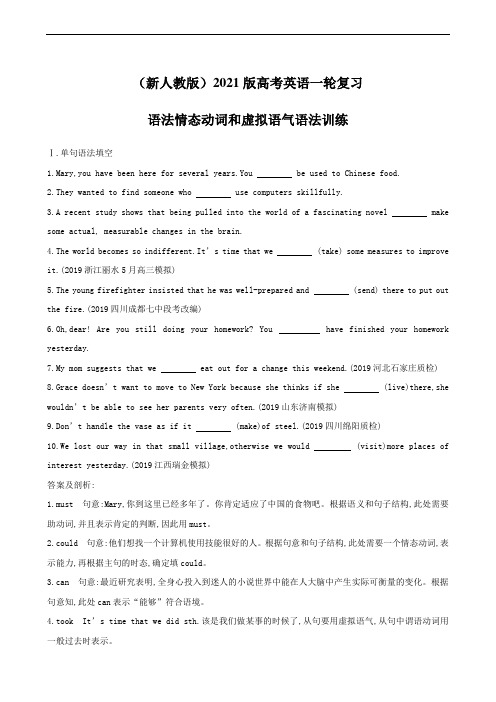
(新人教版)2021版高考英语一轮复习语法情态动词和虚拟语气语法训练Ⅰ.单句语法填空1.Mary,you have been here for several years.You be used to Chinese food.2.They wanted to find someone who use computers skillfully.3.A recent study shows that being pulled into the world of a fascinating novel make some actual, measurable changes in the brain.4.The world becomes so indifferent.It’s time that we (take) some measures to improve it.(2019浙江丽水5月高三模拟)5.The young firefighter insisted that he was well-prepared and (send) there to put out the fire.(2019四川成都七中段考改编)6.Oh,dear! Are you still doing your homework? You have finished your homework yesterday.7.My mom suggests that we eat out for a change this weekend.(2019河北石家庄质检)8.Grace doesn’t want to move to New York because she thinks if she (live)there,she wouldn’t be able to see her parents very often.(2019山东济南模拟)9.Don’t handle the vase as if it (make)of steel.(2019四川绵阳质检)10.We lost our way in that small village,otherwise we would (visit)more places of interest yesterday.(2019江西瑞金模拟)答案及剖析:1.must 句意:Mary,你到这里已经多年了。
高考英语《情态动词》专项练习
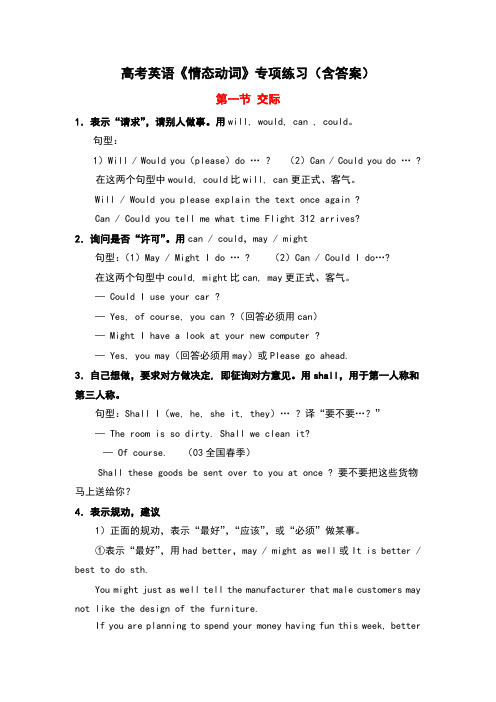
高考英语《情态动词》专项练习(含答案)第一节交际1.表示“请求”,请别人做事。
用will, would, can , could。
句型:1)Will / Would you(please)do …?(2)Can / Could you do … ?在这两个句型中would, could比will, can更正式、客气。
Will / Would you please explain the text once again ?Can / Could you tell me what time Flight 312 arrives?2.询问是否“许可”。
用can / could,may / might句型:(1)May / Might I do … ? (2)Can / Could I do…?在这两个句型中could, might比can, may更正式、客气。
— Could I use your car ?— Yes, of course, you can ?(回答必须用can)— Might I have a look at your new computer ?— Yes, you may(回答必须用may)或Please go ahead.3.自己想做,要求对方做决定, 即征询对方意见。
用shall,用于第一人称和第三人称。
句型:Shall I(we, he, she it, they)…?译“要不要…?”— The room is so dirty. Shall we clean it?— Of course. (03全国春季)Shall these goods be sent over to you at once ? 要不要把这些货物马上送给你?4.表示规劝,建议1)正面的规劝,表示“最好”,“应该”,或“必须”做某事。
①表示“最好”,用had better,may / might as well或It is better / best to do sth.You might just as well tell the manufacturer that male customers may not like the design of the furniture.If you are planning to spend your money having fun this week, betterforget it—you’ve got some big bills coming.(04广东卷)(better forget it相当于You had better forget it.)②表示“有义务或有必要”,用should或ought to。
2021届高考英语语法一轮复习精讲精练情态动词之高考真题精选(1)
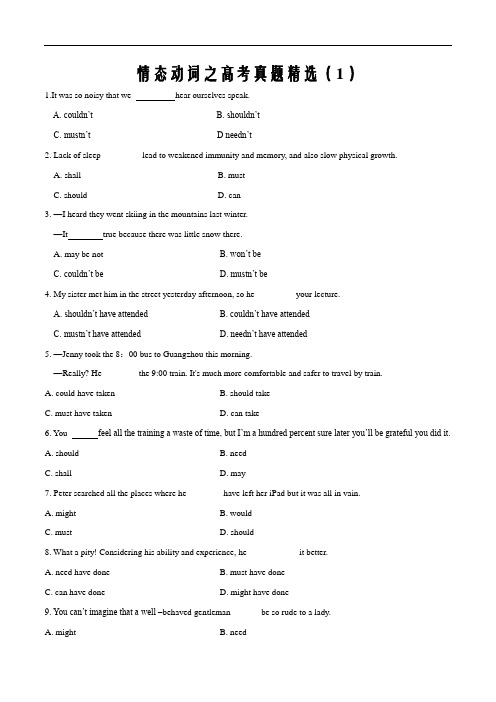
情态动词之高考真题精选(1)1.It was so noisy that we hear ourselves speak.A. couldn’tB. shouldn’tC. mustn’t D needn’t2. Lack of sleep _________lead to weakened immunity and memory, and also slow physical growth.A. shallB. mustC. shouldD. can3. —I heard they went skiing in the mountains last winter.—It true because there was little snow there.A. may be notB. won’t beC. couldn’t beD. mustn’t be4. My sister met him in the street yesterday afternoon, so he _________your lecture.A. shouldn’t have attendedB. couldn’t have attendedC. mustn’t have attendedD. needn’t have attended5. —Jenny took the 8:00 bus to Guangzhou this morning.—Really? He ________the 9:00 train. It's much more comfortable and safer to travel by train.A. could have takenB. should takeC. must have takenD. can take6. You feel all the training a waste of time, but I’m a hundred percent sure later you’ll be grateful you did it.A. shouldB. needC. shallD. may7. Peter searched all the places where he ________have left her iPad but it was all in vain.A. mightB. wouldC. mustD. should8. What a pity! Considering his ability and experience, he ___________ it better.A. need have doneB. must have doneC. can have doneD. might have done9. You can’t imagine that a well –behaved gentleman ______ be so rude to a lady.A. mightB. needC. shouldD. would10. —Artistic people can be very difficult sometimes.—Well, you _________know—you married one.A. mightB. wouldC. shallD. should11. —How long shall we wait here?—The first bus set out earlier than usual today and ________ be here any time, I think.A. shouldB. mightC. canD. must12. We _________ have watered these flowers yesterday. Today’s rain will be too much for them.A. can’tB. shouldn’tC. may notD. mustn’t13.—Can’t you stay a little longer?—It’s get ting late. I really _________go now, my daughter is home alone.A. mayB. canC. mustD. dare14. Tom, you __________leave all your clothes on the floor like this!A. wouldn'tB. mustn'tC. needn'tD. may not15. I’m sorry, but you _________go wrong. There’s no such man here.A. needB. canC. mustD. will16. Paul did a great job in the speech contest. He many times last week.A. need have practicedB. might practiceC. must have practicedD. could practice17. The law is equally applied to everyone. No one _______ be above it.A. shallB. mustC. mayD. need18. It turned out that the hotel was so near. I ______ the taxi.A. needn't have takenB. must have takenC. should takeD. could take19. —It’s so hot and uncomfortable here! Why are your windows still closed?—Oh, I’m not to blame. They ________ open.A. shan’tB. mustn’tC. won’tD. wouldn’t20. —________ the woman with the baby come over? We have a seat here.—Thank you, sir. Actually, I do have my seat here. But my baby likes to look out of the window.A. WouldB. ShallC. MustD. May21. Ann said whenever her father was unhappy, he ________ go out and buy something, usually something large and useless.A. shouldB. couldC. wouldD. might22. Days later, my brother called to say he was all right, but _________say where he was.A. mustn'tB. shouldn'tC. wouldn'tD. mightn't23. — Mum, I've been studying English since 8 o'clock. _______ I go out and play with Tom for a while?— No, I'm afraid not. Besides, it's raining outside now.A. Can’tB. Wouldn'tC. May notD. Won't24. —________you interrupt now? Can’t you see I’m on the phone?—Sorry Sir, but it’s urgent.A. CanB. ShouldC. MustD. Would。
2021年高考英语二轮复习 情态动词语法突破训练
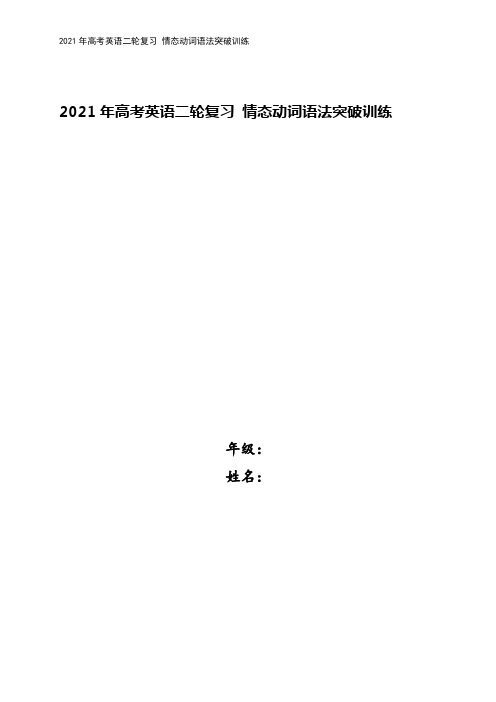
2021年高考英语二轮复习情态动词语法突破训练年级:姓名:情态动词考点一情态动词的基本用法一、can和could的用法1.表示“能力”,意为“能,会”。
例:Samuel, the tallest boy in our class, can easily reach the books on the top shelf.Samuel是我们班最高的男孩,他能轻易地够着书架顶层的书。
It was several minutes before I could take in what he was saying.过了好几分钟,我才理解他说的是什么。
注意:was/were able to表示过去有能力做并成功做了某事,相当于: managed to do sth./succeeded in doing sth.。
2.表示推测,意为“可能”,用于否定句或疑问句中。
can比could语气强。
例:That can’t be Mary—she is in London now. 那不可能是玛丽——现在她在伦敦。
3.表示理论上的可能性,意为“有时候可能会”,用于肯定句。
例:In today’s information age, the loss of data can cause serious problems for a company.在今天的信息时代,数据的丢失有时会对一个公司造成严重的问题。
4.表示礼貌地请求,意为“能,可以”。
在疑问句中could可代替can, 语气更委婉。
例:—Can you tell us your recipe for happiness and a long life?—你能告诉我们你的幸福和长寿的秘诀吗?—Living every day to the full, definitely.—当然是过好每一天。
5.用于固定句式中:can’t...too/enough “无论……也不过分”;“越……越好……”。
专题01 虚拟语气练习-备战2021高考高中英语语法专项突破训练(解析版)

英语虚拟语气练习1.(2020·江苏)If I hadn't been faced with so many barriers, I _____whereI am.A. won't beB. wouldn't have beenC. wouldn't beD. shouldn't have been【答案】C【解析】句意:如果我没有面对那么多的障碍,我现在就不会在这里。
此处是错综时间虚拟语气,根据空后where I am可知,此处是与现在事实相反的假设,主句谓语动词应使用would/could/might/should+do。
故选C。
【总结】考查虚拟语气,本题涉及错综时间虚拟语气的应用。
2.(2019高二下·连云港期末)—What a shame! You missed my birthday party!—I'm terribly sorry, dear. Believe me, if I could have afforded the time, I _________.A. wouldB. shouldC. would haveD. should have【答案】C【解析】句意:——真可惜!你错过了我的生日聚会!——非常抱歉,亲爱的。
相信我,如果我有时间的话,我会参加的。
could have afforded the time表示未曾实现的能力:即表示过去本来有能力可以做某事的,但实际上没有那样去做,通常译为"本来可以""本来能力。
所以本句表示我本可以抽出时间去参加生日聚会,但是我没有。
would+have+done"虚拟语气,表示对过去事情的假设,意思是"本来会做"。
在本句中表示本来会参加的,但实际上没有参加。
故选C。
【总结】考查虚拟语气,本题涉及对过去事情的假设。
高考英语情态动词知识点专项训练及答案(3)
高考英语情态动词知识点专项训练及答案(3)一、选择题1.—You look so tired. You________ late last night.—Yes. I had to to do an important report and stayed up till I completed it.A.should sleep B.must sleepC.should have slept D.must have slept2.—Can I pay the bill by check?—Sorry,sir.But it is the management rules of our hotel that payment _____ be made in cash.A.shall B.needC.will D.can3.—Look at these tracks. It ________ be a wolf. I’m sure about it.—You are right! We have to be careful.A.may B.must C.can’t D.shouldn’t4.For all of the diligent students here, I give you my promise: Work hard, and you ________ be rewarded!A.can B.need C.shall D.could5.She is shy and ________ the teacher’s question.A.dares not answer B.doesn’t dare to answerC.dare not to answer D.dares not to answer6.According to the regulations, anyone who has the intention to be a teacher _______ pass a series of demanding tests.A.can B.would C.might D.shall7.–Will you read me a story, Mummy?--OK. You ______have one if you go to bed as soon as possible.A.might B.must C.could D.shall8.You ______ have carried all these parcels yourself. The shop would have delivered them if you had asked them.A.may not B.needn't C.can't D.mustn't9.—I heard they went skiing in the mountains last winter.—It true because there was little snow there.A.may be not B.won’t be C.couldn’t be D.mustn’t be 10.Skills like critical thinking and analysis ________ be found on the Internet, because they must be acquired in the context of facts.A.can’t B.needn’t C.mustn’t D.shouldn’t 11.—Is Robert coming by coach?—He should, but he ___________ not. He likes driving his car.A.may B.could C.need D.must 12.Schools have been lengthening the school day to raise test marks, which ________ be costly if schools need air conditioning on hot days.A.might B.can C.dare D.need13.—I phoned you yesterday morning. A girl answered, but I didn’t recognize the voice.—Oh, it ________ my younger sister. She was in my room at that moment.A.must have been B.should have beenC.could have been D.may have been14.—Do you know where Tony is?—He _________ in the living room. I saw him there just now.A.shall be B.should have been C.might have been D.must be 15.(2018·天津) I can't find my purse. I___________ it in the supermarket yesterday, but I'm not sure.A.should leave B.must have leftC.might leave D.could have left16.He didn’t follow the doctor’s suggestions as required, but he _________.A.ought B.ought to C.ought to be D.ought to have 17.One of our rules is that every student _______ wear school uniform while at school. A.might B.couldC.shall D.will18.Helen________ go on the trip with us, but she isn’t quite sure yet.A.shall B.may C.must D.can19.—Do you know where David is? I couldn’t find him anywhere.— Well. He ________ have gone far — his coat is still here.A.shouldn’t B.mustn’t C.can’t D.wouldn’t 20.You _________ me about it earlier, but you didn't.A.should have told B.would have toldC.must have told D.should tell21.Tom told us that he ______ come to the party tonight, but he wa sn’t sure about this.A.will B.would C.could D.might 22.—Peter, you delivered a wonderful speech today.—Thanks, but I think I ______ more attention to my stage manners during that time.A.must pay B.should payC.must have paid D.should have paid23.—Can I inform my best friends of the result?—No, I want to keep it a secret . You ____tell anyone.A.won't B.don't have to C.mustn't D.don't need to 24.—Jane, why don’t you take a bite of the chocolate?—Well, I am on diet, if you __________know.A.must B.shall C.would D.could25.Mary is a bit shy and ____ a speech in public, which makes her lose the precious chance to do the voluntary job.A.dares not make B.doesn’t dare makeC.dare not to make D.dares not to make【参考答案】***试卷处理标记,请不要删除一、选择题1.D解析:D【解析】【详解】考查情态动词。
2021年高考英语情态动词语法专题(精编版)
2021年高考英语情态动词语法专题XX年《高考风向标》•英语目录第一部分教材梳理必修一unit 1 friendship单元要点预览语言要点词语辨析词性变化重点单词重点词组重点句子课文要点课文词汇填空课文大意概括课文佳句背诵与仿写单元自测unit 2 english around the world单元要点预览语言要点词语辨析词性变化重点单词重点词组重点句子课文要点课文词汇填空课文大意概括课文佳句背诵与仿写单元自测unit 3 travel journal 单元要点预览语言要点词语辨析词性变化重点单词重点词组重点句子课文要点课文词汇填空课文大意概括课文佳句背诵与仿写单元自测unit 4 earthquakes单元要点预览语言要点词语辨析词性变化重点单词重点词组重点句子课文要点课文词汇填空课文大意概括课文佳句背诵与仿写单元自测unit 5 nelson mandela—a modern hero 单元要点预览语言要点词语辨析词性变化重点单词重点词组重点句子课文要点课文词汇填空课文大意概括课文佳句背诵与仿写单元自测必修二unit 1 cultural relics 单元要点预览语言要点词语辨析词性变化重点单词重点词组重点句子课文要点课文词汇填空课文大意概括课文佳句背诵与仿写单元自测unit 2 the olympic games 单元要点预览语言要点词语辨析词性变化重点单词重点词组重点句子课文要点课文词汇填空课文大意概括课文佳句背诵与仿写单元自测unit 3 computers 单元要点预览语言要点词语辨析词性变化重点单词重点词组重点句子课文要点课文词汇填空课文大意概括课文佳句背诵与仿写单元自测unit 4 wildlife protection 单元要点预览语言要点词语辨析词性变化重点单词重点词组重点句子课文要点课文词汇填空课文大意概括课文佳句背诵与仿写单元自测unit 5 music单元要点预览语言要点词语辨析词性变化重点单词重点词组重点句子课文要点课文词汇填空课文大意概括课文佳句背诵与仿写单元自测必修三unit 1 festivals around the world 单元要点预览语言要点词语辨析词性变化重点单词重点词组重点句子课文要点课文词汇填空课文大意概括课文佳句背诵与仿写单元自测unit 2 healthy eating单元要点预览语言要点词语辨析词性变化重点单词重点词组重点句子课文要点课文词汇填空课文大意概括课文佳句背诵与仿写单元自测unit 3 the million pound bank note 单元要点预览语言要点词语辨析词性变化重点单词重点词组重点句子课文要点课文词汇填空课文大意概括课文佳句背诵与仿写单元自测……第二部分语法专题专题一冠词专题二名词专题三代词专题四数词专题五形容词和副词专题六介词专题七情态动词专题八非谓语动词专题九动词和动词短语专题十动词的时态专题十一动词的语态专题十二句子种类专题十三名词性从句专题十四定语从句专题十五状语从句专题十六倒装句和省略句专题十七强调句专题十八虚拟语气专题十九主谓一致专题二十直接引语和间接引语第三部分高考题型讲练听力完形填空语法填空阅读理解信息匹配基础写作读写任务第二部分语法专题版权所有:专题七情态动词i、重点难点解析情态动词的高考命题导向:情态动词表示说话者的情感和态度,有一定的含义,但是不能单独做谓语,必须与其他动词连用。
高考英语情态动词语法专题训练及答案(完整版)
高考英语情态动词语法专题训练(名师精讲必考语法知识点+实战真题,值得下载练习)一、情态动词的定义情态动词是一种本身有一定的词义,表示说话人的情绪、态度或语气的动词,但不能单独作谓语,只能和其他动词原形构成谓语。
情态动词数量不多,但用途广泛,主要有:can (could), may (might), must, need, ought to, dare (dared), shall (should), will (would) .二、情态动词的位置情态动词在句中放在谓语动词之前,谓语动词前若有助动词,则在助动词之前,疑问句中,情态动词放在主语之前。
•I can see you. Come here. 我能看见你,过来吧。
•He must have been away. 他一定走了。
•What can I do for you? 你要什么?•How dare you treat us like that! 你怎么敢那样对待我们!三、情态动词的语法特征1)情态动词不能表示正在发生或已经发生的事情,只表示期待或估计某事的发生。
2)情态动词除ought 和have 外,后面只能接动词原形。
3)情态动词没有人称,数的变化,即情态动词第三人称单数不加-s。
4)情态动词没有非谓语形式,即没有不定式,分词,等形式。
四、情态动词的用法(一). can; could; be able toCan 1. 表示“能力”(此时过去时是could) What can you do?2. 表示许可、请求,“可以”。
在口语中,can可以代替may表示许可,而may比较正式。
(此时用could 或might语气更委婉)--Can/Could I go now?--Yes, you can.3 表示推测(否,疑),把握很大,could也可表推测(肯,否,疑),把握比can小。
--Look! Someone is coming! Who can it be?--It can’t be him. He has gone to Paris.(不可能)He could be here soon. 他很快就来。
(word完整版)高中情态动词练习及答案(2021年整理)
(word完整版)高中情态动词练习及答案(word版可编辑修改)编辑整理:尊敬的读者朋友们:这里是精品文档编辑中心,本文档内容是由我和我的同事精心编辑整理后发布的,发布之前我们对文中内容进行仔细校对,但是难免会有疏漏的地方,但是任然希望((word完整版)高中情态动词练习及答案(word版可编辑修改))的内容能够给您的工作和学习带来便利。
同时也真诚的希望收到您的建议和反馈,这将是我们进步的源泉,前进的动力。
本文可编辑可修改,如果觉得对您有帮助请收藏以便随时查阅,最后祝您生活愉快业绩进步,以下为(word完整版)高中情态动词练习及答案(word版可编辑修改)的全部内容。
情态动词练习1。
It is usually warm in my hometown in March, but it ____ be rather cold sometimes。
A。
must B. can C。
should D. would2。
You ______ be hungry already ———— you had lunch only two hours ago!A。
wouldn’t B. can’t C. mustn't D. needn’t3。
———- What do you think we can do for our aged parents?-——- You ____ do anything except to be with them and be yourself.A. don’t have to B。
oughtn’t to C。
mustn’t D. can't4。
John promised his doctor he ______ not smoke. And he has never smoked ever since。
A。
might B. should C. could D. would5. What a pity! Considering his ability and experience, he ______ better。
- 1、下载文档前请自行甄别文档内容的完整性,平台不提供额外的编辑、内容补充、找答案等附加服务。
- 2、"仅部分预览"的文档,不可在线预览部分如存在完整性等问题,可反馈申请退款(可完整预览的文档不适用该条件!)。
- 3、如文档侵犯您的权益,请联系客服反馈,我们会尽快为您处理(人工客服工作时间:9:00-18:30)。
英语情态动词练习
1.— Where_____Mary have put the empty bottles?
—She _____them away.They must be somewhere.
A. can;mustn't have thrown
B. must;needn't have thrown
C. could;couldn't have thrown
D. should;might not have thrown
2.My computer start in the morning. There must have been something wrong with it I guess.
A. shouldn't
B. wouldn't
C. needn't
D. mustn't
3.The law is equally applied to everyone. No one _______ be above it.
A. shall
B. must
C. may
D. need
4.—It’s so hot and uncomfortable here! Why are your windows still closed?
—Oh, I’m not to blame. They ________ open.
A.shan’t
B. mustn’t
C. won’t
D. wouldn’t
5.—Many people in England love to give advice on weather reporting. —Yes, but I think the weather office’s computers _____ be more accurate.
A. can
B. need
C. ought to
D. might
6.—I feel washed out. Let's call it a day.
—Hold out a little longer. Now that we have come so far. We ______ as well go all the way.
A. can
B. must
C. should
D. may
7.The principal in our school has recently passed a rule that students _______ wear school uniforms in our campus.
A. may
B. should
C. will
D. shall
8.If we had paid enough attention to the issue of the heavily-overloaded vehicles, the tragedy of the collapse of an overpass in Wuxi _____ avoided.
A. should
B. could be
C. should have been
D. could have been
9.AI will surely be a feature of future life, but it _____ be used responsibly and in a proper way.
A. can
B. need
C. must
D. will
10.— John graduated from college at a very young age.
— Oh, he _________a very smart boy then.
A.could have been
B. must have been
B.C. should be D. might be
11.—These apples look really tasty.
—They ______! See the price $5.99 a pound. Very expensive, aren't they!
A.should
B. might
B.C. could D. would
12.No one _______be more generous; he has a heart of gold.
A. need
B. must
C. dare
D. could
13.There is no light in Smith’s room. Therefore, he ________ be at home.
A. wouldn’t
B. mustn’t
C. shouldn’t
D. can’t
14.There are over 50,000 signs in modern Chinese but luckily, Chinese children ______ learn all of them for everyday purpose.
A. needn't
B. mustn't
C. can't
D. won't
15.While we ______ think we know what we want, we’re often wrong.
A. may
B. will
C. shall
D. must
16.According to a newly released regulation on online video services, no one _____ generate, release or spread fake news or information by using such technologies.
A. can
B. shall
C. will
D. may
17.Jenny _______ have kept her word. I wonder why she changed her mind.
A. must
B. should
C. need
D. would
18. I ______ have worried before I came to the new school, for my classmates here are very friendly to me.
A. mightn’t
B. mustn’t
C. needn’t
D. couldn’t
19.—Jim ________ what I said annoying though he didn’t say anything.— So you mean you will have to apologize to him?
A.must find
B. might find
C. should have found
D. must have found
20.1 have one regret about the time I spent in high school: I _______ more advanced classes that are really helpful in college.
A. couldn't have taken
B. should have taken
C. needn't have taken
D. must have taken。
